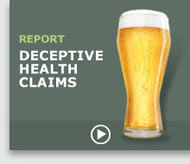Food Politics
How are our food choices both personal and political?
What’s wrong with our industrial food system?
How do corporations and government influence our food choices?
What about personal responsibility?
Don’t people know that eating unhealthy food is bad for you?
Why can’t people just choose to eat healthy foods?
What is the impact of marketing on our food choices?
Why can’t parents just say no to their kids?
Aren’t companies just selling what the public wants to eat?
Aren’t food companies now selling healthier products?
Why can’t we rely on food companies to solve the problem?
Isn’t this a complex problem that any one thing won’t solve?
Isn’t government control over our food choices anti-freedom?
Aren’t you just anti-corporate and against capitalism?
Will more government regulations really solve the problem?
What kinds of food policy reforms do we need?
How are our food choices both personal and political?
Poor eating habits are not personal failings, but rather the result of a social and economic environment that does not support making healthy food choices. Making personal dietary improvements is just one component of social change. We must also bring about reforms that will support people in making healthy food choices over the long term, as well as help them create a more just, humane, and sustainable food system.
What’s wrong with our industrial food system?
Our industrial food economy, led by an increasingly small group of transnational food conglomerates and buffeted by corporate-influenced government policies, is the root cause of a host of preventable public health, environmental, and social justice problems. Over the past century, this system has helped move whole plant foods away from the center of the plate, replacing them with a highly processed, animal product centered diet rich in salt, sugar, fat, and chemical additives. The social costs of this development have been profound. They include a worldwide epidemic of diet-related diseases such as heart disease and diabetes; ecological devastation stemming from unsustainable agricultural practices; and the widespread exploitation of farm and food industry workers. Because of these troubling social, public health, and environmental costs, a diet based on whole, unprocessed plant foods, and policy reforms that would make such a diet accessible and affordable to all, are what’s needed.
How do corporations and government influence our food choices?
Because of their enormous financial and political resources, corporations and the government agencies that regulate them have an enormous influence over our food choices and the information we receive about them. With their huge advertising budgets and conspicuous presence in schools, entertainment media, and civic life, today’s giant food companies have had an easy time ingraining their products into our culture and transforming our way of eating – usually in an unhealthy direction. At the same time, the government agencies charged with regulating the food industry have often been more concerned with safeguarding corporate financial interests than protecting the public health. The US Department of Agriculture, for example, is obliged to serve as a booster of the meat and dairy industries while also providing the public with sound nutrition guidelines – a clear conflict of interest.
What about personal responsibility?
We hear much in the media these days about the role of personal responsibility when it comes to dietary choices. Often the debate is framed as black and white, but it’s not that simple. Those of use who advocate for policy solutions do not believe that personal choices have no role to play at all. However, there are several faulty assumptions at play when people talk about personal responsibility. These are discussed below.
Don’t people know that eating unhealthy food is bad for you?
Of course, some people know. But don’t assume that just because you know, that means everybody does. How can most people know when so much of the information about what we eat is kept hidden? Where are busy people supposed to get information when their own government won’t provide the truth about a healthful diet? Certainly not from the corporations whose interests are served by keeping people in the dark. And just providing a few pieces of information, such as calories or fat grams, doesn’t even begin to tell the entire story.
Why can’t people just choose to eat healthy foods?
One of the biggest false assumptions implicit in the personal responsibility argument is that most people can simply choose to eat healthy foods. But the reality is that most people do not have access to fresh produce and other whole foods. Usually the people who make such statements live in privileged neighborhoods with a huge supermarket and maybe even a natural food store and/or a farmers market. This is the exception rather than the rule. In many areas, the only choice people have is their corner liquor store or mini-mart, where food options range from Coke to Doritos. There are also transportation challenges that limit many people’s access to healthy food. Even for people who can shop in supermarkets, the options are still limited. It’s no wonder that people don’t want to eat fruits or vegetables when they taste so terrible. Produce available year-round in large supermarket chains is bred for travel, not taste. That’s why the tomatoes taste like cardboard and the fruit is rock-hard. Faced with these options, it’s understandable why people turn to highly processed foods.
What is the impact of marketing on our food choices?
No discussion of personal responsibility is complete without recognizing that the food industry spends upwards of $36 billion annually to market its products. While most of us like to think we are immune from advertising, the truth is that corporations do not spend that kind of cash without a return on their investment. The food business is extremely competitive because there is a limit to how many calories people can actually consume. So corporations battle it out by fighting for your food dollar with heavy promotions to make unhealthy food cheap, tasty, and ubiquitous. Marketing strategies such as “Dollar Menus” and “Meal Combos” are designed to get you to think you’re getting a great deal. But what they really do is get people to consume more while corporations get rich. Moreover, any counter-marketing strategies such as government-sponsored “5-a-Day” programs to promote fruits and vegetables simply cannot compete on the same scale.
Why can’t parents just say no to their kids?
In the debate over the causes of childhood obesity, parents are often given a bad rap. We hear arguments such as, children don’t drive themselves to fast food places, and that parents just need to turn off the television. Of course, parents have an important and critical role to play in teaching their children good eating habits and in modeling that behavior. However, we also cannot ignore the fact that food corporations spend roughly $12 billion a year directly targeting children with junk food marketing. If parents are supposed to be the ones making decisions for their children, then why are companies bypassing parents altogether and marketing directly to kids? Because corporations such as McDonald’s aim to undermine parental authority by getting children to nag their parents. And it’s not only marketing for junk food that parents must contend with, but also for toys, video games, clothing, CDs, cell phones, computers, you name it. So, which battles are parents expected to fight? And why have we set up a situation where parents must continuously say no to their children?
Aren’t companies just selling what the public wants to eat?
This is a fundamental question of the market economy: Does consumer demand for certain products drive supply or does the way companies push certain products create the demand? Clearly humans need to eat, so the demand is certainly there. The factors people say are most important to them in making food choices, include: price, taste, convenience, and access. These are exactly those factors that companies selling the unhealthiest foods seek to exploit. In contrast, too often healthier foods cost more, are less convenient, are not readily available, and have the perception of being less tasty. Therefore, the major food companies (along with government agencies) have made it almost impossible for people to demand any alternatives. Put another way, imagine if we started from scratch: if we wanted to design a system that ensured that people had access to the cheapest, least expensive, most convenient foods, would we at the same time create a system that destroys the planet, drives up health care costs, harms animals and exploits human labor?
Aren’t food companies now selling healthier products?
We are hearing much in the news these days about how some food companies are trying to become “part of the solution.” For example, McDonald’s is now offering apple slices and Kraft is selling whole grain Chips Ahoy. While some of these changes may be marginal improvements, they represent only a drop in the bucket when it comes to the overall ways that junk food is marketed. People who may buy these so-called healthier products represent a minor, niche market. McDonald’s best-selling products will always be burgers and fries because that’s why people go there. Moreover, relying on the likes of McDonald’s to provide “healthier products” ignores all the other social problems fast food companies create, such as environmental destruction, animal welfare abuses, and labor exploitation. Similarly, we cannot rely on packaged food companies such as Kraft to re-formulate its way into healthier foods. Simply put, healthy food does not come in a box. Nature intended for us to eat whole, unprocessed foods and Kraft cannot provide that no matter how much “whole grain” they add to Chips Ahoy.
Why can’t we rely on food companies to solve the problem?
The main problem with relying on corporations to solve the problem is that it ignores the fundamental rules of capitalism. By law, a corporation is obligated to increase profits for its shareholders. This means that no matter what they say, the bottom line must always prevail over other priorities. So, while Kraft can make a healthier cookie, if the product doesn’t sell well enough in the competitive marketplace, it won’t last long on the shelves. That explains why when McDonald’s introduced a “McLean” burger and it didn’t sell well enough to satisfy shareholder demands for profit, the product was discontinued.
Isn’t this a complex problem that any one thing won’t solve?
Yes, the public health mess created by a market-driven food system controlled by multi-national corporations is complex and requires a comprehensive strategy. Saying that addressing any one component (such as marketing to children or factory farms) won’t solve the problem is a convenient excuse for not doing anything. Each individual component must be addressed and we need to start somewhere. People who advocate for any one strategy are not saying this is the only solution; it’s just one part of a much bigger puzzle. It’s also true that we need to pay greater attention to how individual strategies fit together.
Isn’t government control over our food choices anti-freedom?
Sometimes people get nervous talking about government policy and food choices, as the very idea is an affront to personal freedom and the American way. But the truth is that government is already intimately involved. From setting standards for food safety, to giving nutrition advice, to subsidizing agriculture, federal agencies wield tremendous influence over what types of foods we eat and the information we receive about them. Food choices do not take place in a vacuum. The American political economy (and increasingly the global economy) is driven by crucial government policies that keep the engine of capital flowing. What advocates want is to shift government policies away from those that harm public health to those that are health-promoting and environmentally sustainable. Also, it’s important to distinguish between government controls over individual rights versus reasonable regulation of corporate behavior. For example, requiring fast food companies to provide nutrition information is not an infringement on anybody’s freedom to eat what they want, but rather a reasonable way to get corporations to be more truthful about their products.
Aren’t you just anti-corporate and against capitalism?
No particular political mindset is required to understand that corporations are in business to make money. Indeed this is the legal definition of a corporation. There is nothing wrong with a profit-making per se. The trouble is that corporations must continue to grow or die. This creates such a single-minded focus on profit generation that all other costs are externalized, meaning that someone else must bear them. So for example, let’s say a company shifts from growing hogs on a small scale to factory farm production because they must expand or else get beat by the competition. In this business decision, environmental and animal welfare concerns are shunted aside in the name of profit generation. Does this model really make sense?
Will more government regulations really solve the problem?
Government regulations such as menu labeling or restrictions on marketing to children are important because they will certainly help in the short term, but are still only a temporary fix because corporations are very clever. As we’ve seen from other issues, big companies will always find new strategies to get around government regulations. For example, with strict tobacco laws in this country resulting in lower smoking rates, companies have simply shifted their marketing overseas, targeting developing nations that have fewer regulations. We need a dialogue that allows us to address the more fundamental, underlying structural problems inherent in a market economy.
What kinds of food policy reforms do we need?
To protect consumers from the food industry’s most harmful products and practices, advocates have traditionally fought to strengthen the regulatory powers of the government agencies in charge of our food policies. For example, some have worked to institute tougher food safety measures, while others have attempted to secure increased funding for healthy food education programs. While acknowledging the need for, and value of, such reform strategies, advocates must move beyond such conventional piecemeal legislative remedies.
The myriad ills that our food system has produced are actually “symptoms” of the deeper structural flaws of our profit-driven global food economy, which places the financial interests of corporate agribusiness and food conglomerates ahead of the public good. Clearly, moving this system in a more just, sustainable, and humane direction will require instituting sweeping changes, not just a little “tinkering under the hood.”















